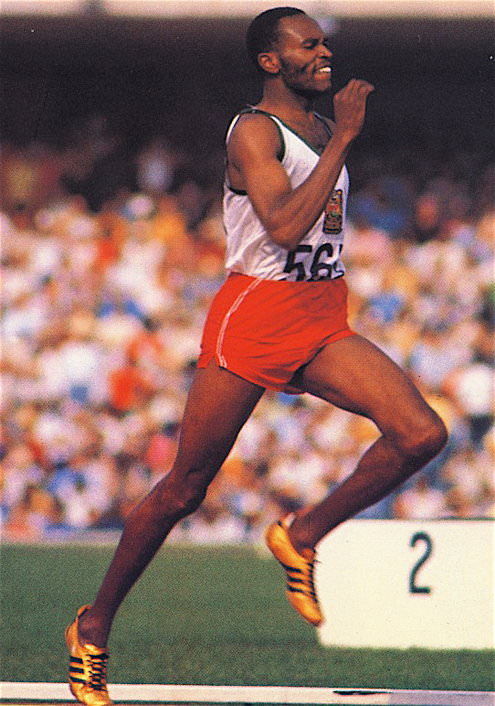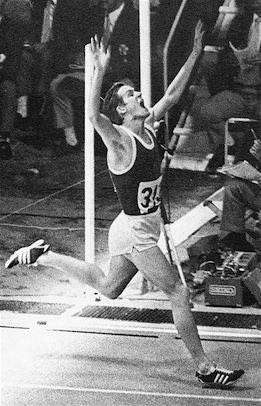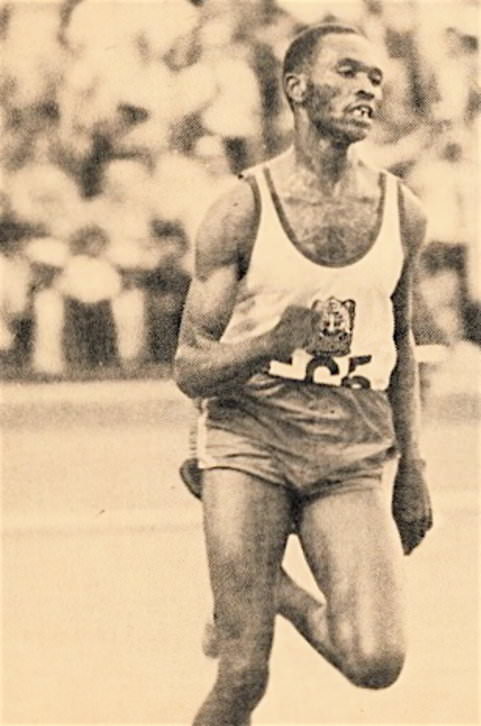1962 European Championships Belgrade, Yugoslavia, September 12-16 800Ranked third and second in the world in 1960 and 1961, Paul Schmidt (31) of Germany was the 800 favorite. And he had looked good in winning his semi-final. His compatriot Manfred Matuschewski (23) also had good credentials, with a 9th place world rankings in 1960. Further, both German runners had been Olympic finalists in Rome, placing fourth and sixth. The two Russians, Krivosheyev and Bulishev, also looked like possible medalists. As well, Ireland’s Derek McCleane was considered to have a chance (his talented team-mate Noel Carroll was eliminated in the first round).
1964 Olympic GamesTokyo, October 10-24 800There was much speculation over the fitness and intentions of the current 800 WR holder and Olympic champion Peter Snell. Unlike his rivals, he had not raced in Europe over the summer. Further, he had run only 1:48.5 in the earlier New Zealand summer. He told the press that the 1,500 was his main goal, so some doubted whether he would run the 800. And Snell was giving nothing away as to his fitness or his plans. In fact he was not sure himself about the 800. He had trained incredibly hard over the New Zealand winter, at one stage averaging 100 miles a week over a 10-week period. This distance training was followed by a sharpening period. But this was all done in the New Zealand winter, so he was unable to run any fast time trials. Any concern over his 800 speed was eradicated soon after his arrival in Tokyo when he ran a 1:47.1 time-trial. This convinced him that he could do both the 800 and 1,500.

1966 British Empire & Commonwealth GamesKingston, JamaicaAugust 4-13 880 Three of the top four finishers from the Tokyo Olympic 800 final were in the field. George Kerr, running in front of his home crowd and finally running in a major 800 race without Peter Snell, looked like a good bet for the gold. But the younger Kenyan Kiprugut was another favorite after his impressive semi-final. And then Bill Crothers, who had looked so good finishing second in Tokyo, was fancied by many pundits. Finally there were two Australians, Ralph Doubell and Noel Clough, as well as the fast-improving Brit Chris Carter.
1966 European ChampionshipsBudapest, HungaryAugust 30-September 4 800There was a stellar field for the final of this event. Favorite was the new Euro record-holder Franz-Josef Kemper (1:44.9). Fellow West German Bodo Tummler, who had won the 1,500 three days earlier, was also fancied. The Great Britain also had two finalists: British record-holder Chris Carter and John Boulter. But the runner who received the most interest was the current Euro champion Manfred Matuschewski of East Germany. In 1962 he had shocked everyone with his phenomenal finishing kick. But in the Tokyo Olympics he was eliminated in the semifinals. Was he at 27 past his best?

1969 EUROPEAN CHAMPIONSHIPSATHENS, SEPTEMBER 16-20 Cold-War politics led to a boycott by the West German team for this major championships. The issue was the eligibility of the fastest 5,000 runner entered: Jurgen May. May had defected from East Germany to West Germany two years and three months previously. East Germany had erased May’s name from all their athletic records; West Germany was anxious to have him in their team for these championships. The IAAF had to rule on May’s eligibility and used the three-year qualification period for any athlete changing countries. As May had not met this three-year residency requirement, he was not allowed to compete. In response, the whole West German team withdrew. Thus the championships lost one of the very best teams. In the running events, this meant that Walter Adams, Bodo Tummler, Harald Norpoth and, of course, Jurgen May were denied a chance to compete. British runners took advantage of this and racked up an impressive tally of three gold, one silver and two bronze medals in the five running events.

1970 Commonwealth GamesMeadowbank Stadium, Edinburgh, Scotland, July 17-25 There were two big changes from the previous 1966 Games in Jamaica. First, the distances were metric for first time. Second, the track was a synthetic all-weather track. No more cinders! 800Olympic Champion Ralph Doubell of Australia was the clear favorite. In the previous Commonwealth Games he had been sixth. Another hopeful was Benedict Cayenne, who had finished 8th behind Doubell in the 1968 Olympic 800 final. The Trinidadian had run a fast 1:46.83 in the semifinal.
1971 European ChampionshipsAugust 10-15 Helsinki, Finland The Finnish people had waited a long time for another Paavo Nurmi to raise their patriotic spirits. The flamboyant 5,000/10,000 double of Juha Vaatainen was thus hugely appreciated, especially since the location was the Finnish capital. He was head and shoulders above anyone else as the star of the meet for the running events. 800There were two outstanding athletes in this event: the returning champion Dieter Fromm from East Germany and Russian Yvgeniy Arzhanov, who had been undefeated in 33 races since his fourth-place finish behind Fromm in the 1969 Euros. These two runners were the same age, having been born within one day of each other in April 1948.